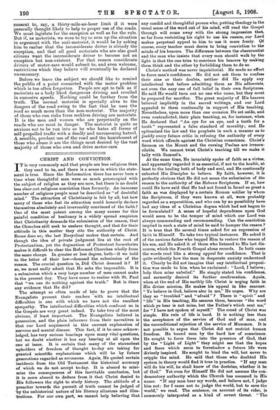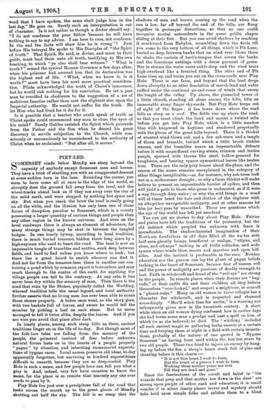CHRIST AND CONVICTION.
TT is very commonly said that people are less religious than they used to be, and there is a sense in which the state- ment is true. Since the Reformation there has never been a time when thoughtful men were as much preoccupied with the subject of religion as they are now, but there is no doubt less clear-cut religious conviction than formerly. An immense number of religious people must be described as "of doubtful mind." The attraction of Christianity is felt by all, but how many of those who feel its attraction could honestly declare themselves absolutely and irrevocably convinced of the faith ? One of the most potent among the many causes for this painful condition of hesitancy is a widely spread suspicion that Christianity demands the submission of the reason, that the Churches still seek to enslave thought, and that for their attitude in this matter they cite the authority of Christ. Rome does so; the last Encyclical makes that certain. And though the idea of private judgment lies at the root of Protestantism, yet the dogmatism of Protestant formularies makes it difficult to clear the Reformed Churches wholly from the same charge. In greater or less degree, both—if we hold to the letter of their law—demand the submission of the reason. The crucial question is, Did Christ demand it ? If so, we must Badly admit that He asks the impossible. It is a submission which a very large number of men cannot make in the present day. They have come to realise with St. Paul that "we can do nothing agaiust the truth." But is there any evidence that He did?
The attempt so often made of late to prove that the Evangelists present their readers with no intellectual difficulties is one with which we have not the smallest sympathy. The intellectual difficulties which confront us in the Gospels are very great indeed. To take two of the most obvious, if least important. The Evangelists believed in possession, and the plain inference from their narratives is that our Lord acquiesced in this current explanation of nervous and mental disease. This fact, if it be once acknow- ledged, has very serious bearings upon many vital questions, but we doubt whether it has any bearing at all upon the one at issue. It is certain that many of the staunchest upholders of freedom of thought to-day are taking for granted scientific explanations which will be by future generations regarded as erroneous. Again, He quoted certain incidents from the Old Testament the historical accuracy of which we do not accept to-day. It is absurd to mini- mise the consequences of this inevitable conclusion, but it is more absurd to deduce from it that Christ denied to His followers the right to study history. The attitude of a preacher towards the pursuit of truth cannot be judged of by the unhistorical nature of his literary allusions and illus- trations. For our own part, we cannot help believing that
any candid and thoughtful person who, putting theology in the usual sense of the word out of his mind, will read the Gospel through will come away with the strong impression that so far from restricting his right to use his reason, our Lord makes perpetual appeal to him to use it more freely. Of course, every teacher must desire to bring conviction to the minds of his hearers. The difference between the obscurantist and the man who insists that every man should walk by the light is that the one tries to convince his hearers by making them think and the other by forbidding them to do so.
Christ's method was never inquisitorial. He made no effort to force men's confidence. He did not ask them to confess their sins or their doubts, neither did He apply any intellectual test before admitting them as His adherents, not even the easy one of full belief in their own Scriptures. He said He would turn out no one who came, but they must be prepared for sacrifice. The great majority of His hearers believed implicitly in the sacred writings, and our Lord appealed to them continually in support of His teaching. Nevertheless, upon more than one occasion He set aside, and even contradicted, their plain teaching, as, for instance, when He declared that "An eye for an eye, and a tooth for a tooth" represented a false standard of morality ; and He epitomised the law and the prophets in such a manner as to justify every future critic in refusing the authority of every word which offends against the Christian conscience. Christ's Sermon on the Mount and the cursing Psalms are irrecon- cilable. We cannot twist Christ's teaching till we make it tally with Samuel's.
At the same time, He invariably spoke of faith as a virtue, and apparently regarded it as essential, if not to the health, at least to the healing both of body and soul, and He continually exhorted His Disciples to believe. By faith, however, it is perfectly obvious that He did not mean the submission of the reason to the authority of the Hebrew Scriptures. If so, bow could He have said that He bad not found in Israel so great a faith as was displayed by a certain Roman soldier by whom the Scriptures, if they were known at all, were probably regarded as a superstition, and who can by no possibility have had any ideas of a Christian dogma which had not begun to be formulated ? A sense of hopeful dependence upon God would seem to be the temper of mind which our Lord was always commending and recommending. Can the conviction implied in such a state of mind be said to hamper the reason ? It is true that He several times asked for an expression of faith in Himself. To take two typical instances. He asked it of the anxious father who begged Him to restore the reason of his son, and He asked it of those who listened to His last dis- course, which the Fourth Gospel alone records. In both cases the words read like a strong appeal for confidence. That is quite evidently how the man in desperate anxiety understood it. Clearly he did not imagine that any intellectual proposi- tion was made to him when he exclaimed : "Lord, I believe; help thou mine unbelief." He simply stated his confidence, and earnestly desired its further confirmation. Again, when at the end of His earthly life Christ is urging faith in His divine mission, He makes his appeal in like manner. "Ye believe in God, believe also in me," He urges. Why are they so "troubled" and " afraid " ? There is " spirit " and "life" in His teaching, He assures them, because "the word which ye hear is not mine, but the Father's which sent me," for "I have not spoken of myself." The creed of Christ was simple. His rule of life is hard. It is nothing less than the acceptance of the service of God and of man, and the unconditional rejection of the service of Mammon. It is not possible to argue that Christ did not restrict human freedom. He bound men by the hard law of conscience. He sought to force them into the presence of God, that by the "Light of Light" they might see that the hopes and fears which seem to foreshadow a future life were divinely inspired. He sought to bind the will, but never to cripple the mind. He said that those who doubted His system in theory would find it true in practice. "If any man will do his will, he shall know of the doctrine, whether it be of God." Yet even for Himself He did not assume the con- demnatory authority which the Church has assumed in His name. "If any man hear my words, and believe not, I judge him not: for I came not to judge the world, but to save the world," we read. The sentence, on account of its rider, is commonly interpreted as a kind of covert threat. "The word that I have spoken, the same shall judge him in the last day," He goes on. Surely such an interpretation is out of character. Is it not rather as though a doctor should say : 411 do not condemn the poor fellow because he will have nothing to say to my advice. I am here to cure, not condemn. In the end the facts will show him he is wrong"? Just before His betrayal He spoke to His Disciples of "the Spirit of truth." That Spirit, He said, is divine, and must be their guide, must lead them unto all truth, testifying to His own teaching, to which "ye also shall bear witness." "What is truth ?" mused the cynical Roman Governor a few days after, when his prisoner had assured him that its declaration was the highest end of life. "What, when we know it, is it worth P" must have been his next more practical considera- tion. Pilate acknowledged the truth of Christ's innocence, but he would risk nothing for his conviction. He let a just man be crucified in obedience to the suggestion of a set of malicious fanatics rather than cast the slightest slur upon the Imperial authority. He would not suffer for the truth. He let Him who bad lived for it die for it.
Is it possible that a teacher who could speak of truth as Christ spoke could recommend any man to close the eyes of his mind? Surely Galileo resisted the Spirit which proceeds from the Father and the Son when he denied his great discovery in servile subjection to the Church, while con- sciously or unconsciously he surrendered to the authority of Christ when he exclaimed: "But after all, it moves."



































 Previous page
Previous page